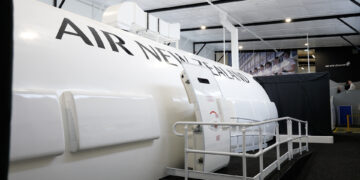Boeing on path to ‘transformational change,’ commercial jet CEO says
Boeing 737 MAX aircraft are assembled at the companyâs plant in Renton, Washington, U.S. June 25, 2024.Â
Jennifer Buchanan | Via Reuters
LONDON â Boeing‘s output of 737 Max planes is showing signs of improvement, the new head of its commercial unit said ahead of a major air show on Sunday, while admitting that the manufacturer has “disappointed” customers with delayed planes.
Boeing is trying to get past several safety and manufacturing crises, including the midair door plug blow out in January, which have slowed deliveries of planes to airlines and prompted the Federal Aviation Administration to increase its oversight of the storied manufacturer.
Stephanie Pope, in her first press conference since taking over the key role at the troubled aircraft manufacturer in March, reiterated that Boeing has committed to increasing production of the Max to 38 a month. Production slipped into the mid-20s per month in the first half of the year, analysts have said.
Pope said Boeing is on the right path to improving its manufacturing quality, safety and predictability of deliveries, a “transformational change” that she said will take years.
“It still doesn’t take away the reality that we’ve disappointed” our customers, she said at a press conference before the Farnborough Airshow, outside of London. “We’ve impacted their business and we haven’t met the commitments and lived up to being the partner that they expect and they need us to be.”
Boeing has unveiled a host of goals aimed at getting it back on the right path, like improving worker training and manufacturing processes, among others. In the spring it delivered an improvement plan to the FAA that the agency ordered after the blowout in January.
“This plan is not a three month plan,” said Pope. “I call it transformational because some of these actions will take years.”
As part of the leadership shakeup that promoted Pope to head the commercial unit, Boeing’s CEO Dave Calhoun said he would step down by year’s end.
When asked whether she was interested in the role, Pope said she is focused on the commercial unit’s recovery.
“That that is my priority,” she said.
Boeing’s problems aren’t limited to its commercial program, however. Its defense unit has also been grappling with delays, including of the money-losing and delayed modification of two Boeing 747s that will serve as the next two Air Force One aircraft.
The CEO of that unit, Ted Colbert, said Boeing continues “to fight through some of the challenges that really stemmed from challenges in the supply chain.”
Boeing reports quarterly results on July 31 and is set to report charges from that unit, Colbert said at the same press conference.
Read more CNBC airline news
Leave a Reply Cancel reply
- Trending
- Comments
- Latest
CFPB fines Equifax $15 million for errors on credit reports
Stocks making the biggest moves midday: NVO, QRVO, JBHT
Stocks making the biggest moves premarket: JBHT, QRVO, FAST
TTMiles
Travel with me and experience each trip as a magical chapter in my travelogues. Come along with me as we discover the marvels of the globe one engrossing tale at a time.
Read more
Categories
Recent News
CFPB fines Equifax $15 million for errors on credit reports
Stocks making the biggest moves midday: NVO, QRVO, JBHT
© 2024 Trilliontravelmiles - The one stope travel news site by Trilliontravelmiles.















































